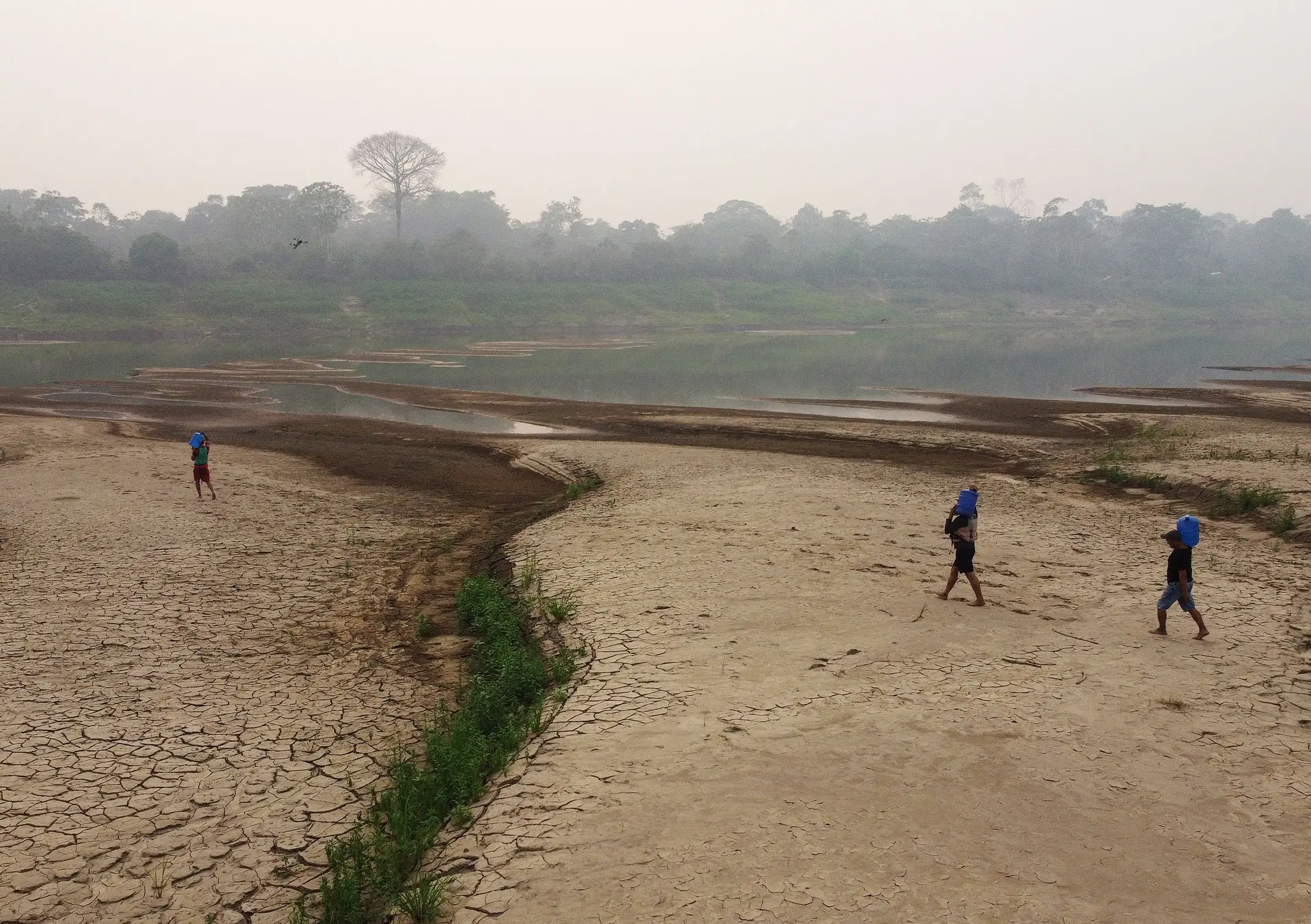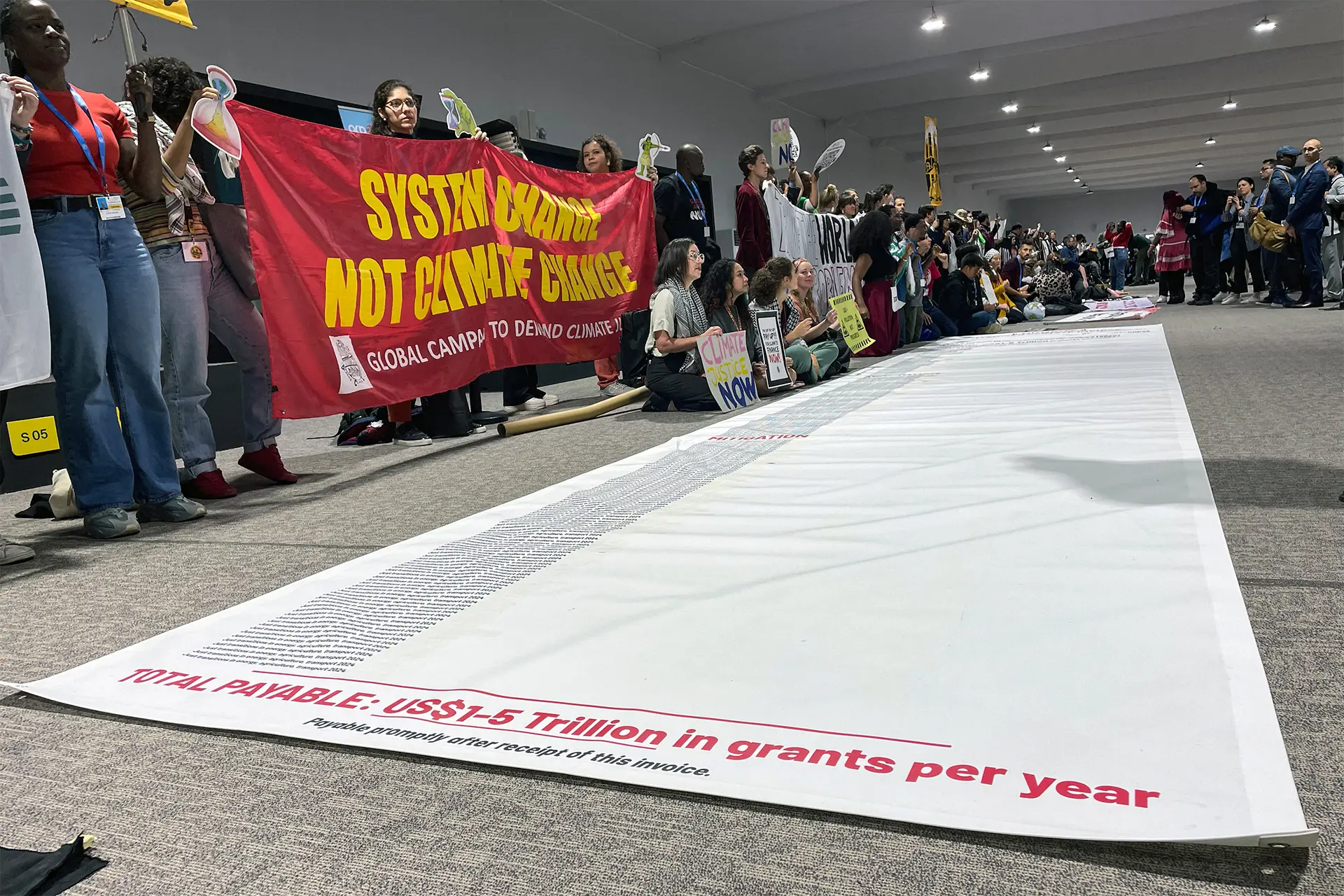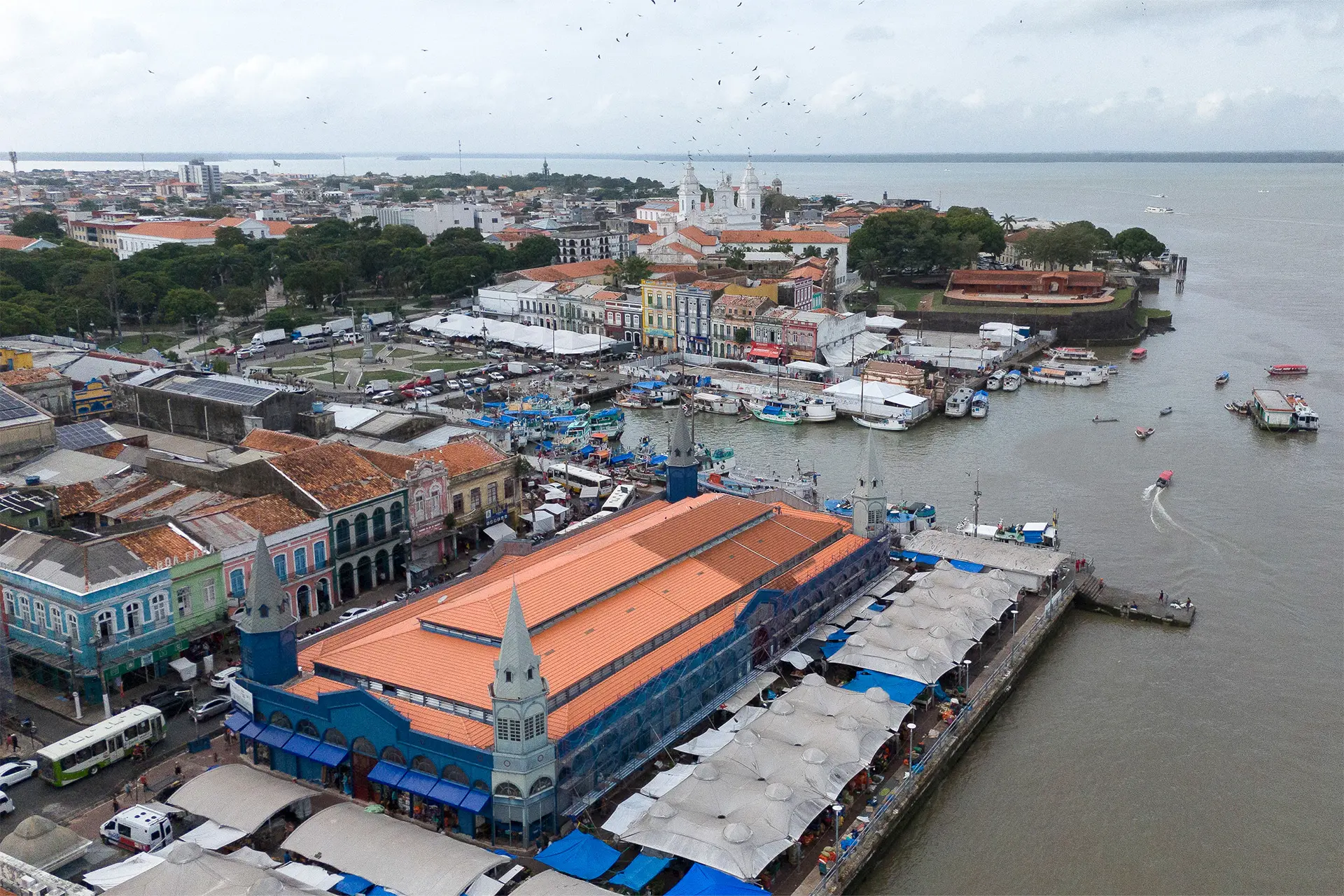2024 was the year when climate and earth system scientists lost hope. The effects of human-caused climate change came sooner than they had expected. Brazil’s Carlos Nobre said he was “horrified,” and Sweden’s Johan Rockström, the director of Germany’s Potsdam Institute for Climate Impact Research, said the planet’s experts were “seriously nervous.” The phrase “climate emergency” gained even more heft when the past year was confirmed as the hottest since measurements began in the mid-19th century. Earth’s temperature exceeded the limit considered relatively safe for life of 1.5 degrees Celsius – and if the current trajectory of greenhouse gas emissions remains unchanged, this trend will continue in the coming years.
The rise in Brazil was higher, estimated at 1.8 C by Berkeley Earth, a research center in California. Climatologist Jose Marengo, with Brazil’s National Center of Natural Disaster Monitoring and Alerts, told O Globo newspaper that central South America and Mexico are “boiling like never before.” Floods ravaged the state of Rio Grande do Sul and extreme drought in the Amazon allowed fires to easily spread, which then anomalously affected extensive areas of standing forest that had been weakened by deforestation as well as a lack of rainfall in 2023.
Despite this scenario, most of the authorities in the Lula administration, the political class in general, and those holding the wealth in the country set to host the 30th United Nations Climate Change Conference (COP-30), in November, do not seem to have noticed the climate emergency is real. Talking about “climate collapse,” by the way, better expresses the current risk of life going extinct. And the Amazon, where the meeting will be held, holds the keys to determining if there will be a future – and this too is no rhetorical exaggeration, because if the forest dies, life – as we know it – on this planet will die. So, what can be done to radically cut the pollutant gasses flooding the atmosphere, in Brazil and the world, and prevent this from being another failed international meeting should be the top concern for everyone in power.
Unfortunately, this does not seem to be the case.

The worst drought on record, in 2024, produced apocalyptic scenes, such as Ribeirinhos carrying water over the dry bed of the Madeira River. Photo: Edmar Barros/Amazônia Latitude
In theory, combating climate change is a “transversal” topic for the government. That is why there is an inter-ministerial committee working on this matter, which even approved the new target to reduce emissions that Brazil introduced at COP-29, in Baku, Azerbaijan. In practice, only the environment and climate change minister, Marina Silva, and Brazil’s lead climate negotiators – ambassador André Corrêa do Lago, representing the Foreign Affairs Ministry, and Ana Toni, the climate change secretary – have insisted on urgent action. They are backed, less frequently, by the team at the Treasury Ministry, run by Fernando Haddad, which is tasked with drafting an Ecological Transformation Plan that, under a Balkanized ministry, lacks coherence.
Marina and the head of the Indigenous Peoples Ministry, Sonia Guajajara, posted about record temperatures in 2024 to their Instagram accounts, for example. The president’s chief of staff, Rui Costa, whose ministry houses the extraordinary secretary in charge of infrastructure and logistics at COP-30, made no such comments. Nor has agriculture minister Carlos Fávaro, who is responsible for the economic sector which is both the main culprit behind deforestation and one of the sectors most affected by these extreme events. Nor has there been any such comment from Alexandre Silveira, the head of the Mines and Energy Ministry, an oil and gas enthusiast who has yet to deliver an energy transition plan.
Beyond the federal authorities, the debate cannot be confined to journalists, environmentalists, and the most fragile communities on the front lines of the devastation. If agribusiness wants to seem respectable, it should publicly push back on those sponsoring laws like the one recently passed by the Legislative Assembly in Mato Grosso to classify areas of the Amazon Rainforest as Cerrado to allow more trees to be toppled. The country’s southerners, seeking Amazonian lands and still imbued with the order from the business-military dictatorship (1964-1985) of devastating to occupy, need to hear from their own peers that their grandchildren run the risk of starving to death on parched earth.
Perhaps it is futile to want financial market advocates, who think of nothing beyond the next day and look for clones of Javier Milei and Donald Trump to hoist into the government in Brasília, to realize there may not be a tomorrow. Yet it is useless to sit and explain that inflation has risen and is pressuring the government to cut costs on the backs of the poorest because the price of food keeps rising, here and abroad. The climate will bring about crop losses and make it harder to produce food, even more so in an anti-ecological world system, dependent on commodities that need to travel huge distances to fulfill their role of feeding cows and pigs.
Authorities, politicians, and large companies need to comprehend that the COP is not an event to sell the Amazon as a tourist destination. It is not a conference to leverage anyone’s political cachet depending on whether it succeeds or fails, be it Lula (Workers’ Party), Pará governor Helder Barbalho (Brazilian Democratic Movement), or the avowed foes of Nature. It is not an opportunity for companies with environmental liabilities, like Vale, JBS or Itaipu, to do some greenwashing. It is not a trade show. It is not a festival of Amazonian food, crafts, and music.
COP-30 is the last chance to get the planet off a catastrophic trajectory. It is also the final opportunity to redeem the credibility of climate negotiations, which have been demoralized by the sluggish or non-existent implementation of the UN Framework Convention on Climate Change, which turns 33 this year, and especially of the Paris Agreement, which turns 10 years old.
Ambiguity is the name of the agreements
International treaties on the climate and on Nature and all the decisions made under their auspices are international law, and they are therefore valid as law for all of the nearly 200 countries that have signed them. The problem is these agreements resort to ambiguous language and establish no penalties for the governments that fail to fulfill them.
To counter this, organizations and countries have turned to international and national courts, as was the case of a suit brought before Brazil’s Federal Supreme Court against the environmental dismantling promoted by the far-right Jair Bolsonaro (Liberal Party). Vanuatu, an island country in Oceania, is currently leading a suit asking the International Court of Justice, a UN body, to issue a report on the legal obligations nations have to protect the climate system and the environment.
Ambiguity has been a feature of environmental documents since the United Nations Conference on the Environment and Development, also known as the Eco-92 Earth Summit, which was held in Rio de Janeiro and originated the three conventions on climate, biodiversity and desertification. George H. W. Bush (Bush senior), who was at the time president of the United States, the biggest historical polluter, only decided to come to Rio once he was sure the language being negotiated “was sufficiently vague” so as not to compromise his country, as physicist José Goldemberg, then the environment secretary under the Fernando Collor administration, relayed in journalist Claudio Angelo’s book O Silêncio da Motosserra: Quando o Brasil Decidiu Salvar a Amazônia (The Silence of the Chainsaw: When Brazil Decided to Save the Amazon, freely translated).
This ambiguity allows for a lack of consensus on the meaning of climate finance, for example. The Climate Convention and the Paris Agreement make clear that historical polluters should provide this finance to the rest, with the collaboration of other countries who are urged to participate voluntarily. Yet, while nations with fewer monetary resources insist this money should be public, in the form of donations, those who hold the biggest debts with the planet are trying to transfer their obligations to private companies and multilateral banks, which then set conditions and charge interest rates that are impractical for many countries that do not have their own money – and who generally contributed the least to the climate’s collapse.

The climate conference in Baku made no progress against fossil fuels and left Belém with the tough job of getting polluters to pay. Photo: Laurent Thomet/AFP
This was the impasse that brought the COP in Baku to a bitter end, with most of the countries outraged by the new agreement on the climate finance target. Last year’s conference also failed to carry on the decision made in 2023, in Dubai, to gradually eliminate fossil fuels, which are mainly responsible for saturating the atmosphere in toxic gasses. Nor was any document approved from the working group on a “fair transition,” aimed at balancing the provision of technological and financial resources worldwide to ensure the Paris Agreement is implemented in a way compatible with the eradication of poverty.
As the COP-30 host, Brazil inherited a pile of unfinished tasks, and many are part of a mandatory agenda for the conference in Belém. These include improving the New Collective Quantitative Goal, or NCQG, as the finance mechanism is now called. The document on a fair transition will need to be picked back up, finalizing the indicators that will guide national plans to adapt to climate change. In addition, all of the countries will this year have to introduce new emissions reductions targets by 2035. It will also be important to discuss whether the set of Nationally Determined Contributions – the official name of the goals – is compatible with the global heating containment goal established in the Paris Agreement. Ideally, Brazil needs to reintroduce into the COP agenda a proposed timeline to cease the use of fossil fuels. The conference, as repeated by authorities from the Environment Ministry and diplomats, will need to be the “implementation COP.”
It is an exhaustive and intensive agenda, more so in the current international environment, which some diplomats and analysts classify as being as unstable as the period preceding World War II and the least favorable for climate negotiations since the current system of global environmental governance was put in place at the 1992 Earth Summit in Rio. Trump, returning to power arm-in-arm with large tech, oil and finance companies, has promised to withdraw the USA from the Paris Agreement and strengthen far-right denialism around the world, with the help of unregulated social media.

On the day he was sworn in for a second term, Donald Trump confirmed his intent to withdraw the US from the Paris Agreement, making an extremely difficult situation worse. Photo: Nicolas Guyonnet/Hans Lucas via AFP
In addition to the United States, other major producers of fossil fuels and petrochemical products, like Saudi Arabia and Russia, took steps to get out of Baku unscathed and torpedoed an international agreement against the pollution caused by plastics. France and Germany, usually at the forefront of European Union decisions, are experiencing a period of political instability, with divided electorates and weak governments. Russia’s war on Ukraine and Israel’s war on Gaza have fed gains in the oil and arms industries. Containing China, now the biggest polluter in absolute terms and the top producer of equipment for the energy transition, is the main goal for the United States and one shared in part by Washington’s traditional allies.
Serbian-American economist Branko Milanović, a former head of the World Bank’s research department, connected Trump’s reelection to the current stage of global capitalism. For him, the republican president personifies a moment where “only low tax rates, deregulation and worship of profit remain” of the globalizing neoliberalism Western powers were preaching from the 1990s up through the first decade of this century. The system requires no social veneer now, like equality among genders or ethnicities. Banks and money managers in the US have diluted or abandoned initiatives that promoted investment in non-polluting activities.
Nevertheless, what is at stake for all human and non-human people is survival, and this is bigger than these very tough circumstances. As the host country of the COP-30 and as a nation devastated by the effects of the climate collapse, Brazil needs to build alliances in negotiations and move forward proposals with the potential to turn the tables, which also means making choices domestically.
In 2024, Lula proposed creating a UN Council on Climate Change, to speed implementation of the Paris Agreement. Yet it is still not known how personally committed Brazil’s president will be to unblocking negotiations. The moves to undermine the COP and the environmental and climate reputation of Brazil and its government are, however, quite clear. After dipping considerably in 2023, deforestation in the Amazonian biome began ticking up again from July to November 2024, according to the alert system run by the Amazon Institute of People and the Environment. At the same time, Petrobras, the other oil companies, and cabinet members like mines and energy minister Alexandre Silveira have doubled down on their push to get Brazil’s environmental regulator, Ibama, to approve licenses to open a new frontier of exploration on the Amazonian coast.
The urgency of ‘global solidarity levies’
There are proposals on the table that could combine increased climate finance and pressure on the only language the major polluters understand: money. They are aimed at establishing special taxes on the super-rich, the fossil fuels trade, aviation and shipping. This is what environmentalists call “global solidarity levies,” which would help to finance the energy and ecological transition. In addition to these levies, Ana Toni, the Lula administration’s climate change secretary, has mentioned measures like forgiving foreign debt in exchange for climate action and reforming multilateral banks, a topic that was put on the agenda by the Brazilian government when it led the G-20, the group of the largest economies. The problem of debt is also a priority for South Africa, which will preside over the G-20 this year. The question is: are Lula and his government going to work to move these propositions forward? Will the COP president, whose job is to conduct negotiations for the best possible result, have the president’s support to shoot for the loftiest ambitions?
Right after the COP in Baku, Johan Rockström, of Sweden, and 20 other scientists and economists sent an open letter to all of the countries that signed the Climate Convention, to the UNFCCC secretariat, and to UN secretary-general António Guterres. The impressively blunt letter sought to show why it is in the interest of materially wealthy countries to immediately increase climate finance. Reality, its authors say, is showing the 2C cap on the temperature’s rise set in the Paris Agreement is not compatible with maintaining a habitable balance of life on Earth.
If the breach of the 1.5 C limit is consolidated in the coming years, the text explains, this will lead to the collapse of five of the 16 systems regulating climate on the planet, including the Greenland and West Antarctic Ice Sheets and the Labrador sea current, which cools the North Atlantic. The letter notes the pollution “budget” the world can spend before the temperature continues to rise beyond 1.5 C is 200 billion tons of carbon gas, which equals just five years of emissions at the current pace.
For Earth to reach the end of this century with a controlled increase of 1.5 C, countries need to cut emissions by 40% to 50% by 2030, the scientists and economists warn. Even if this happens, the “best scenario” now possible among the scenarios forecast by the UN’s Intergovernmental Panel on Climate Change is for Earth’s temperature to reach a peak increase of 1.7 to 1.8 C over 30 to 40 years, before it starts to fall again. In this scenario, everything must be done to ensure the oceans and forests (and in this case especially the Amazon, the world’s largest tropical forest,) maintain their capacity to absorb around 50% of the carbon humans dump into the atmosphere. It is the planet’s mistreated waters and trees that have kept life from ending so far. “We face potentially unmanageable risks, already within the next decades,” the authors conclude.
Although not a historic polluter, Brazil is today one of the biggest greenhouse gas emitters, mostly because of the predation in its biomes. Brazilians are and will be fully affected by the effects of Nature’s destruction. It is an enormous responsibility, and it is time to exercise it.

Mercado Ver-o-Peso, um dos símbolos de Belém, cidade que acolherá a primeira COP na Amazônia. Foto: Pablo Porciuncula/AFP
Editing: Eliane Brum
Photo Editor: Soll
Fact-checker: Plínio Lopes
Proofreader (Portuguese): Valquíria Della Pozza
Spanish translation: Julieta Sueldo Boedo
English translation: Sarah J. Johnson
Copyediting and finishing: Natália Chagas
Editorial workflow: Viviane Zandonadi
Editor-in-chief: Talita Bedinelli
Editorial director: Eliane Brum






